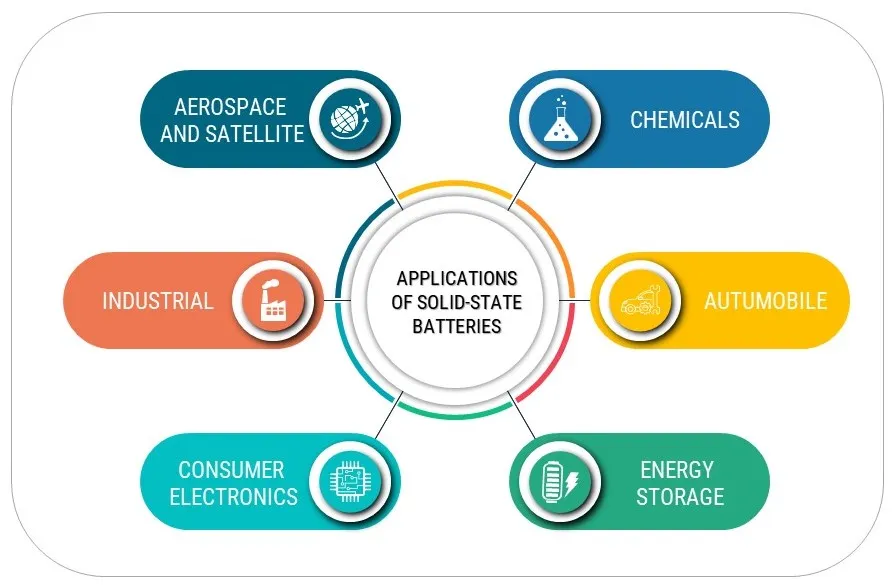A solid-state battery is a battery technology that uses a solid electrolyte instead of liquid electrolytes, which are behind lithium-ion technology. It is a rechargeable energy storage system similar in structure and operation to the more familiar lithium-ion battery. The difference between them is that a lithium-ion battery contains a liquid electrolyte while a solid-state battery—as its name suggests—features a solid one. This allows solid-state batteries to be lighter, have more energy density, offer more range, and recharge faster. These batteries can reach 80% charge within 15 minutes and incur less strain after multiple charging cycles.
A lithium-ion battery begins to degrade and lose power capacity after 1,000 cycles. On the other hand, a solid-state battery maintains 90% of its capacity even after 5,000 cycles. Research has been conducted to reduce battery charging times. For instance, in September 2021, researchers from UC San Diego, supported by LG Energy Solution, Ltd. (South Korea), created a solid-state battery with an all-silicon anode that can potentially deliver long-life, high-energy density, and fast charging capabilities, making EVs cheaper and more practical. Such research in the field of solid-state batteries to reduce charging times is expected to boost the growth of this market.

Solid-state batteries in consumer electronics increase battery life and charge cycles and more power delivery, indicating more processing power. Due to their small size, these batteries provide more room inside the device for other components. The solid nature of electrolytes in the batteries keeps the devices cool while running, making the processors' thermal design much more efficient. Furthermore, solid-state can provide fast charging, i.e., 80% in 15 minutes. These benefits of solid-state batteries in consumer electronics products are expected to increase the demand for solid-state batteries. Consumer electronics manufacturers are demonstrating solid-state batteries in their products. For instance, in March 2020, Samsung (South Korea) demonstrated a new prototype of a solid-state battery. This new solid-state battery developed by Samsung using silver-carbon (Ag-C) anode is expected to solve the dendrite problem. In June 2019, Murata Manufacturing Co., Ltd. (Japan) developed a solid-state battery for wearable devices. The company developed these solid-state batteries with a larger capacity of 2mAh to 25mAh. Such initiatives are expected to boost the demand for solid-state batteries in consumer electronics devices.
EV companies are taking initiatives to develop solid-state batteries by partnering with specialized manufacturers. For instance, in May 2021, Ford (U.S.) and BMW (Germany) invested USD 130 million in a solid-state battery startup, Solid Power, to reduce costs and increase the range of their future EVs. Furthermore, in October 2021, SK Innovation (South Korea), a battery manufacturer, partnered with Solid Power to develop and manufacture solid-state batteries for EVs using the latter's proprietary electrolyte technology, validate Solid Power's all-solid-state battery and electrolyte production processes, and further develop the technology. In September 2021, Toyota (Japan) invested USD 13.6 billion and demonstrated a new battery technology, Bipolar Battery (a nickel-metal hydride battery), in the Japanese market.
Following are the key trends in the market:
- Automotive OEMs are heavily investing in battery manufacturing companies to support the development of solid-state batteries. For instance, in May 2021, Ford Motor Company (U.S.) and BMW AG (Germany) invested in the start-up Solid Power. The company’s solid-state technology could deliver 50% more energy density than current-gen lithium-ion batteries. Ford expects to cut battery costs by 40% by mid-decade.
- Solid-state batteries have been commercialized significantly in the medical devices industry as several manufacturers are designing and offering solid-state batteries to power medical devices, such as temperature sensors, pacemakers, and smart patches.
- Companies are taking initiatives to develop solid-state batteries for the aviation industry. For instance, in December 2020, QuantumScape Corp developed a new solid-state lithium-metal battery that could be used in electric aircraft. Additionally, research has been conducted to develop solid-state batteries for the aviation industry. For instance, in April 2021, NASA (U.S.) created a battery with SABERS activity (Solid-state Architecture Batteries for Enhanced Rechargeability and Safety). Under this activity, NASA aimed to research how to create a safer battery using brand-new materials and novel construction methods. The project used a unique combination of sulfur and selenium to hold an electric charge.
Thus, the growth of these solid-state batteries is driven by the high energy density of solid-state batteries and their faster charging & better safety compared to Li-ion batteries. Furthermore, the rising application of solid-state batteries in EVs and an increase in R&D investments for the development of solid-state batteries are creating growth opportunities for players operating in this market.
Read In Detail @ https://www.meticulousresearch.com/product/solid-state-battery-market-5246
Related Tag:
Related Blogs:

Technological Trends in Air Conditioners Market
Read More
Rising Investments and Advancements in the LiDAR Market
Read More
Increasing Adoption of Robots in the Manufacturing Sector
Read More
3D Printers Market
Read More
Solid-State Batteries Market
Read More
Surging Demand for Smart Sensor-enabled Wearable Devices
Read More
3D Machine Vision Meets Industry 4.0
Read More
Optoelectronics – A Promising Technology
Read More
Increasing Utilization of Archimedean Screw Pumps in Sewage Treatment
Read More
Transformative Potentials of 3D Food Printing
Read More
Technological Trends in Air Conditioners Market
Read More
Rising Investments and Advancements in the LiDAR Market
Read More
Increasing Adoption of Robots in the Manufacturing Sector
Read More
3D Printers Market
Read More
Solid-State Batteries Market
Read More
Surging Demand for Smart Sensor-enabled Wearable Devices
Read More
3D Machine Vision Meets Industry 4.0
Read More
Optoelectronics – A Promising Technology
Read More
Increasing Utilization of Archimedean Screw Pumps in Sewage Treatment
Read More
Transformative Potentials of 3D Food Printing
Read More




